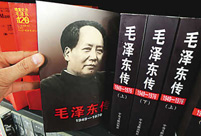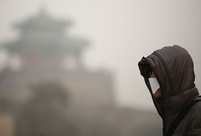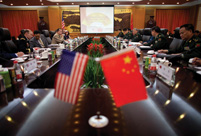 'Jin' named the word of the year by cross-strait netizens
'Jin' named the word of the year by cross-strait netizens Chinese scientific expedition goes to build new Antarctica station
Chinese scientific expedition goes to build new Antarctica station
 Chinese naval escort fleet conducts replenishment in Indian Ocean
Chinese naval escort fleet conducts replenishment in Indian Ocean 17th joint patrol of Mekong River to start
17th joint patrol of Mekong River to start China's moon rover, lander photograph each other
China's moon rover, lander photograph each other Teaming up against polluters
Teaming up against polluters
BEIJING, Dec. 26 -- Japanese Prime Minister Shinzo Abe's visit to the WWII Yasukuni Shrine in Tokyo on Thursday, is a dangerous step toward militarism and will lead to further deterioration of China-Japan relations, and regional stability.
The move denies history, hurts the peoples again who were invaded by Japan, and shows the continuous rise of Japan's right wing.
Abe's visit comes on the first anniversary of his assuming office. It is also the first visit by a serving Japanese prime minister since Junichiro Koizumi visited on Aug. 15 in 2006, the day commemorating Japan's unconditional surrender to Allied Forces in 1945.
The notorious Yasukuni Shrine, which honors Japan's war dead including 14 Class-A convicted WWII criminals, arouses nothing but painful memories that Japan brought to China and its other neighbors.
It is like a wound on all war victims that has never truly healed, and the visits by Japanese politicians reopen this old wound, time and time again.
The international community is worried about the intention of Abe and the ruling Liberal Democratic Party. His visit shows that militarism has never been rooted out in Japan.
Abe's visit to the shrine, in defiance of strong opposition by China and other East Asian countries, shows Japan's right leaning government and its politicians have never truly reflected on the country's fate in WWII, however, they keep making moves to deny the world system established at the end of the conflict.
Because of this, China-Japan relations have moved sharply backward as since Abe took office.
After Japan's attempt to "purchase" part of the Diaoyu Islands, Chinese territory, Japanese cabinet members visited shrine. Japan is also striving to amend its constitution so that Japan can possess "normal" armed forces with "normal rights" to wage war.
Japanese cabinet approved a national security strategy and revised defense plans earlier this month, seeking a military buildup amid festering historical and territorial disputes.
Japanese government has made provocative statements on China's Air Defense Identification Zone in the East China Sea, ascribing its military buildup and provocative foreign policy to the so-called "China Threat".
Abe and his government must realize the potential danger of their acts and the consequences of a further worsening of China-Japan relations.
China and other peace-loving countries will not let the matter drop until Japan takes positive attitude to history and make efforts to repair damaged ties with China and other countries.
 Commemorate 120th birth anniversary of Mao Zedong
Commemorate 120th birth anniversary of Mao Zedong Female soldiers of PLA Marine Corps in training
Female soldiers of PLA Marine Corps in training Chinese cities to have a very grey Christmas as smog persists
Chinese cities to have a very grey Christmas as smog persists China and U.S. - the national image in each other’s eyes
China and U.S. - the national image in each other’s eyes The Liaoning's combat capability tested in sea trial
The Liaoning's combat capability tested in sea trial Chinese pole dancing team show their moves in snow
Chinese pole dancing team show their moves in snow Rime scenery in Mount Huangshan
Rime scenery in Mount Huangshan Ronnie O'Sullivan: My children mean the world to me
Ronnie O'Sullivan: My children mean the world to me Shopping in Hong Kong: a different picture
Shopping in Hong Kong: a different picture Winter travels in Anhui
Winter travels in Anhui  Bird show opens to public in Calcutta, India
Bird show opens to public in Calcutta, India AK-47 inventor dies at 94
AK-47 inventor dies at 94 Crashed French helicopter salvaged
Crashed French helicopter salvaged Mother practices Taiji with her son
Mother practices Taiji with her son  SWAT conducts anti-terror raid drill
SWAT conducts anti-terror raid drillDay|Week|Month